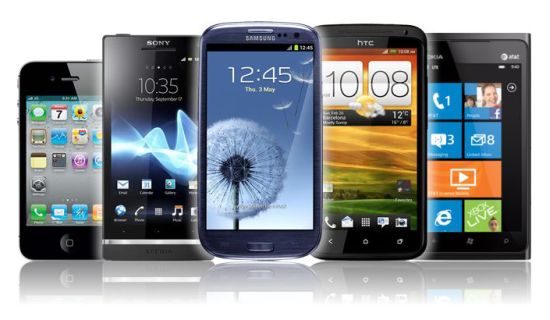According to research firm Gartner, smartphone sales exceeded feature phone sales for the first time in the April-to-June period.
Worldwide mobile phone sales totalled 435 million units. Smartphone sales accounted for 225 million units, up 46.5% from the previous year.
Feature phones totalled 210 million units, down 21%.
The highest smartphone growth rates came from Asia, Latin America and Eastern Europe, Gartner said.
A smartphone is commonly defined as a device that has built-in applications and can connect to the internet.
In contrast, feature phones tend to perform fewer functions and are priced more cheaply.

“Smartphones accounted for 51.8% of mobile phone sales in the second quarter of 2013, resulting in smartphone sales surpassing feature phone sales for the first time,” said Anshul Gupta, principal research analyst at Gartner.
However, a competing firm, IDC, said this milestone had already been reached in the first three months of 2013.
Some analysts said that the price of entry-level smartphones has come down sharply over the past few months, resulting in a major sales boost.
“We have a lot of Asian manufactures such as Samsung, Huawei, ZTE and LG who are coming put with much more affordable smartphone models,” said Andrew Milroy of consulting firm Frost & Sullivan.
“That has helped them tap into a vast consumer base, especially in emerging markets.”
Andrew Milroy added that some mobile phone carriers had also been offering pre-paid data plans, allowing consumers in these markets to limit their bills while using features such as email and mobile applications, which had also helped attract new customers.
Gartner said Samsung continued to be the top seller of smartphones globally, while Apple saw its marketshare come down to 14.2% from 18.8% in the same period a year ago.
Meanwhile, Lenovo, the world biggest PC-maker, managed to gain a lot of market share very quickly with an aggressive push into the smartphone market.
Gartner said that in terms of operating systems, Google’s Android was top, with 79% market share, followed by Apple’s iOS with 14.2%. However, Microsoft overtook Blackberry for the first time to come in third place.
Andrew Milroy said that given the growth in smartphones sales, coupled with a drop in their prices, the future for feature phones looks bleak.
“Feature phones will be a hard sell in about five to 10 years time,” he said.
“It will reach a point where the sales of a new model of feature phone will not be able to justify the amount of time and money that is spent into developing it.”
[youtube WP1Uu2s4QQk]
